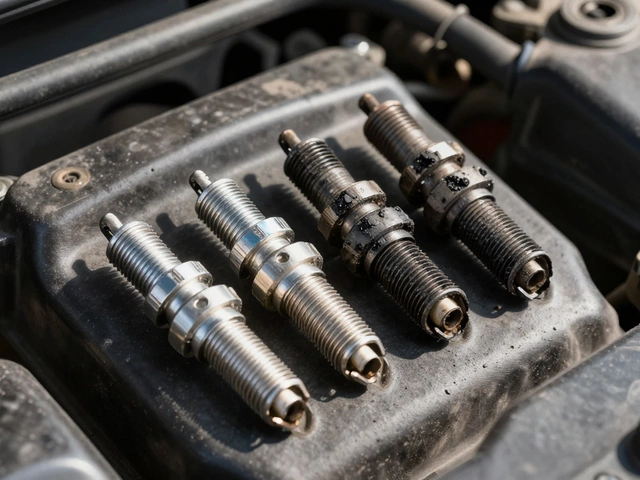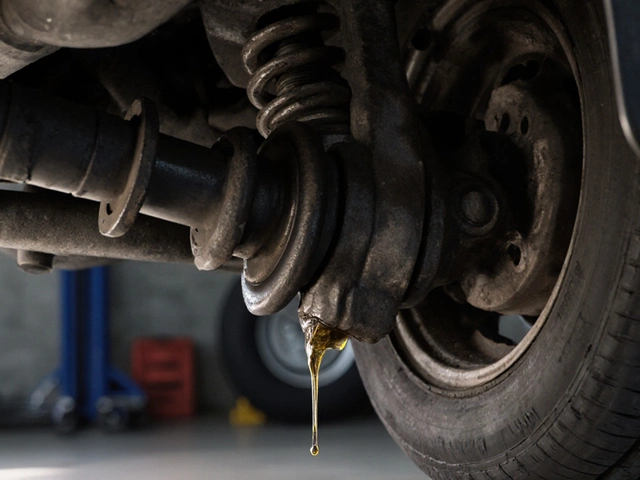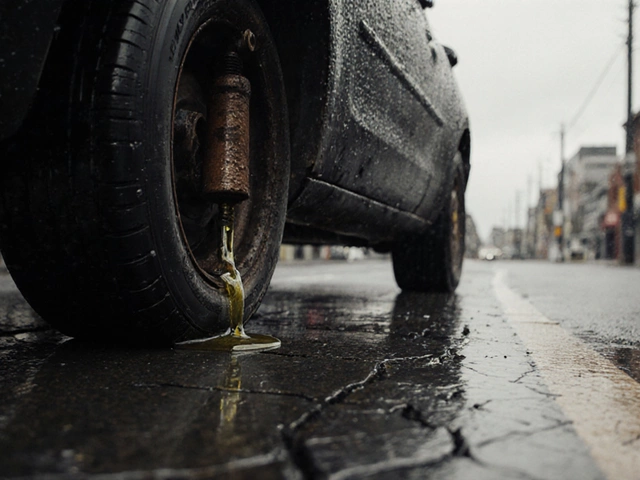Removing your muffler sounds simple—just cut it off, and suddenly your car has a much louder, more aggressive sound. That loud rumble grabs attention, but here’s the deal: the cons can stack up fast.
Most folks start looking at a muffler delete for the sound, but few think about what they’re signing up for. Your car could be way noisier inside and out, which gets old fast, especially on long drives. That’s not just annoying to you, but to your neighbors and anyone stuck next to you at a stoplight.
Don’t forget about the rules, either. A lot of areas have strict noise limits, and a muffler delete can put you on the wrong side of the law real quick. Tickets aren't cheap, and some states won't pass your car for inspection if the exhaust is too wild.
- What Happens When You Delete the Muffler
- Noise Levels and Daily Driving
- Legal and Inspection Problems
- Potential Engine Impact
- Resale Value and Insurance Issues
What Happens When You Delete the Muffler
So, you’re thinking about a muffler delete. Here’s the real story: when you cut out your muffler, you’re removing a chunk of your car’s exhaust system that’s designed to quiet things down. The exhaust gases don’t have to travel through the sound-dampening chambers, so the sound gets a whole lot louder. This isn’t just a little bit of extra growl—this is a serious volume jump.
Your exhaust gases also move more freely, but don’t expect any magic horsepower gain. Most cars, especially the ones not built for racing, won’t see a power boost worth bragging about. According to Car and Driver magazine, "For the average daily driver, a muffler delete makes more noise than performance. The perceived gains are mostly just sound."
If you’re driving a turbocharged car or something built for track days, removing the muffler might slightly decrease backpressure. For most regular vehicles, though, you’re really just increasing noise and possibly messing up how your engine manages exhaust gases.
- Exhaust flow is less restricted, so it’s easier for gases to exit—but not always helpful for everyday cars.
- Sound levels inside and outside your car shoot up. You’ll get drone on the highway, which can get really tiring.
- Getting rid of your muffler can trigger warning lights or sensor issues, especially with newer vehicles that have sensitive emissions tech.
Take a look at the noise difference in decibels (dB) for context:
| Situation | Average dB |
|---|---|
| Stock Exhaust | 70-75 dB |
| Muffler Delete (Idle) | 85-90 dB |
| Muffler Delete (Revving) | 95-100+ dB |
That’s a jump most people aren’t ready for—especially your neighbors first thing in the morning.
Noise Levels and Daily Driving
The first thing you notice after a muffler delete is the noise. Not just outside, but inside your car, too. Without a muffler, there’s nothing to soak up or dampen the sound. The result? Everything gets louder. Highway cruising goes from a mild hum to a constant drone that can give you a headache after half an hour.
There’s not just one type of noise to worry about. On older cars, especially with big engines, you’ll hear more crackles, pops, and even backfires. That might sound cool at first, but day after day, it can get old fast. Passengers might complain, and phone calls through Bluetooth? Good luck. You’ll have to shout just to be heard.
Here's how a muffler delete can affect your daily drive:
- Cabin drone: The sound makes its way into the car, turning even the quietest drive into a noisy ride.
- Long trips get tiring: Studies have shown that prolonged noise above 85 decibels can fatigue you and even affect concentration. Some muffler-deleted cars hit 95-100 dB inside at highway speeds.
- Neighborhood trouble: Your neighbors definitely notice when you come home late. Excessive exhaust noise can annoy people, and some apartments or HOAs give warnings or fines.
- Annoying on cold starts: Early morning starts sound like a thunderstorm. Not a way to win friends with anyone on your block.
Car forums are full of folks who went for a muffler delete, then regretted it because the daily driving experience got worse. If you drive in the city or have a commute, think twice. That aggressive sound isn’t nearly as fun when you’re stuck in traffic, running errands, or taking grandma to the doctor.

Legal and Inspection Problems
Thinking about a muffler delete? You better double-check local laws first. In a lot of states, it’s flat-out illegal to drive a car on public roads if it doesn’t have a working muffler. Yes, even if your cat-back or mid-pipe is still in place. The rules aren’t just for show—cops will actually write you tickets for a loud exhaust, and some of those fines can cost hundreds, easy.
Now let’s talk inspections. In California, for example, a car must meet strict noise standards—no higher than 95 decibels for most cars. Remove the muffler, and odds are, you’ll shoot past that limit just idling in your driveway. States like New York and Texas can also bust you for a muffler delete during yearly inspections. If your car can’t pass, you’re not driving it legally on the road, period.
Here’s a quick look at some states and how they handle muffler deletes:
| State | Muffler Required? | Strict Noise Limit |
|---|---|---|
| California | Yes | 95 dB |
| New York | Yes | Varies by year/make |
| Texas | Yes | "Excessive noise" subjective |
| Florida | Yes | "Unusual noise" banned |
Don’t forget about warranty and emissions checks either. If you delete the muffler, some dealerships might say you’ve tampered with the exhaust system, which can void parts of your warranty. It could also lead to problems during smog or emissions testing, even if you didn’t touch the catalytic converter.
Bottom line: a muffler delete can make your car illegal to drive in a lot of places, and it usually makes inspections tougher (or impossible) to pass. Unless you track your car or it never leaves private property, you’re rolling the dice.
Potential Engine Impact
So, ripping out your muffler and going for the muffler delete isn’t just about making noise. It can actually change how your engine works, and sometimes, not in ways you’d want.
First off, your exhaust system is tuned to create just the right amount of backpressure. That’s a fancy way of saying there’s some resistance as exhaust gasses leave the engine. When you ditch the muffler, you lower that backpressure. For some cars, especially older ones or those not tuned for performance, this can mess with how your engine runs. Too little backpressure can sometimes make your engine lose a bit of low-end torque—the “oomph” you feel when you take off from a stop.
On modern cars, things get trickier. The engine computers are smart, but they still rely on sensors in the exhaust to keep your car running right. Changing the flow with a muffler delete might throw off those readings. Your check engine light could pop on, or your car could run richer or leaner than it should, affecting fuel mileage and long-term reliability.
Let’s look at some facts based on actual shop experiences:
- Signs of poor fuel economy have shown up on OBD2 (On-Board Diagnostics) scans after muffler deletes, especially when paired with other exhaust mods.
- Certain engines, particularly turbocharged ones, might perform a bit better with less restriction, but naturally aspirated engines often don’t see real power gains—sometimes, the opposite.
- You might notice more popping or backfiring sounds. Cool if you want attention, but it’s a warning sign your engine isn’t running at its best.
If you’re still tempted by that louder exhaust note, consider talking to a shop about a performance muffler or a resonator delete instead. Those can give you extra sound without messing up your engine’s balance. Bottom line? Messing with your exhaust system without knowing all the impacts can hurt how your car runs, not just how it sounds.

Resale Value and Insurance Issues
Chopping off your muffler can trash your car’s resale value. A lot of buyers hesitate when they see mods like a muffler delete because it sends up red flags about noise, legal problems, or possible engine wear. Most people looking for used cars want something close to stock—not a project car with lots of alterations.
This doesn’t just hurt the price you’ll get. Some dealerships flat out refuse trade-ins with major exhaust changes since they’re harder to resell and could fail emissions or noise checks. CarMax, for example, is known to ding value or just say ‘no thanks’ to loud exhaust mods. Private buyers might ask for a deep discount if they have to fix or reverse your muffler delete to make the car street-legal.
Insurance can get tricky, too. If your car’s got a muffler delete, your insurer might change your policy or raise your premium. Some companies see exhaust mods as a risk—louder cars are more likely to get pulled over, attract thieves, or be involved in street racing. If you don’t tell your insurer about the switch and later file a claim, they might deny it because the car isn’t as described on your policy.
Just to give you a quick look, check out this sample table on average resale price reductions from known car selling platforms:
| Platform | Estimated Value Loss (USD) |
|---|---|
| CarMax | $700 - $1,200 |
| AutoTrader | $500 - $1,000 |
| Private Sale | $300 - $800 |
So, before you reach for the saw, weigh how much a louder exhaust is worth versus the money you might lose down the line or the insurance headaches you could run into.







Write a comment